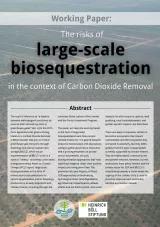The risks of large-scale biosequestration in the context of Carbon Dioxide Removal
The Paris Agreement’s target of limiting global temperature rise to 1.5 degrees is largely dependent on CDR approaches and climate finance institutions are already supporting such afforestation schemes, largely due to the strong emphasis on private-sector involvement in climate finance mechanisms such as the World Bank’s Forest Investment Program.
The report describes existing trends in the field of large-scale biosequestration. It examines the social and ecological impacts of such projects and discusses whether or not these are viable climate solutions. It also showcases successful community led biosequestration alternatives that could prove to be more effective in reversing climate change and in providing long-term sustainable livelihoods.
Product details
Table of contents
- Introduction: Carbon Dioxide Removal post-Paris
- The governance of CDR policies and projects
- BECCS in theory and practice
- The reality of large-scale biosequestration: Climate finance for large-scale tree plantations
- Ecological impacts of large-scale biosequestration
- Portugal case study: Industrial tree plantations and climate change
- Socio-economic impacts of large-scale biosequestration
- Conclusion
- References
